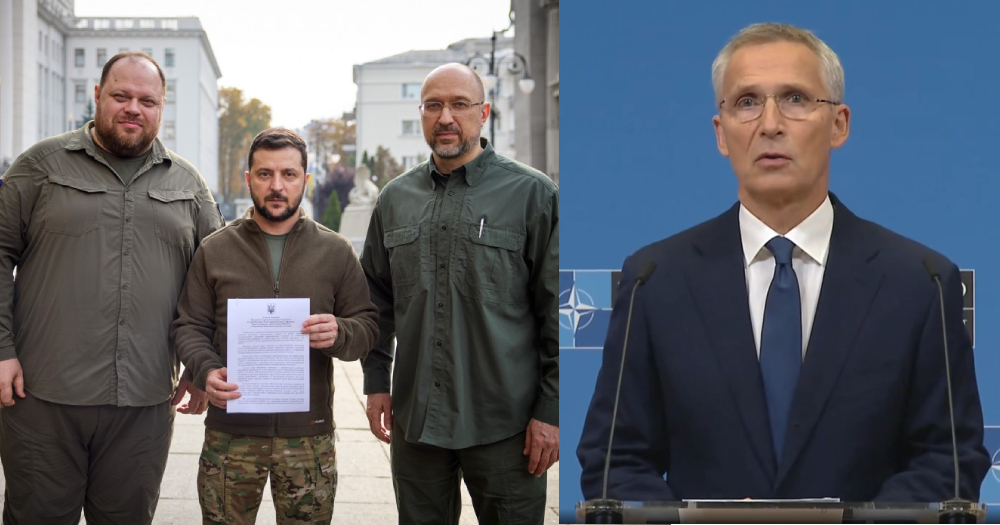Follow us on Telegram for the latest updates: https://t.me/mothershipsg
On Sep. 30, Ukrainian President Volodymyr Zelensky declared that Ukraine would be applying to join NATO, the third country to do so since Russia started a conflict to stop one country from joining the military alliance.
NATO application and sham referendums
Zelensky, flanked by Speaker of Parliament Ruslan Stefanchuk and Prime Minister Denys Shmyhal, released a video formalising Ukraine's application to join the North Atlantic Treaty Organization, or NATO.
Rejecting the sham referendums held in the four partially Russian held regions in the south and east elections, Zelensky reiterated that Ukraine would only consider peace after it has repelled Russia from the entirety of its territory.
Zelensky also rejected negotiations with Russian President Vladimir Putin, saying that Putin "did not know what dignity and honesty were". However, he said, Ukraine would be willing to enter into dialogue with Russia, but only with a different president.
Finally, Zelensky said that the success Ukraine had made in defending its country had been made with the help from NATO. Saying that Ukraine and NATO were already de facto allies, it was his intention to make the alliance de jure, true in word as well as in action. He, along with the speaker and the defence minister, signed a document which Zelensky said was a request to join the alliance on an accelerated schedule.
Zelensky acknowledged the challenges facing such a move, such as the need for all members of the alliance to accept them as members, but he pointed to the example of Sweden and Finland, saying that they had essentially been the model that Ukraine would follow.
He also said that the de facto alliance between Ukraine and NATO had been consolidated on the battlefield and by interacting with members of the alliance, the war having shown that Ukraine had the ability to operate NATO standard equipment, follow NATO standard doctrine and share similar values.
No backing down in the face of nuclear blackmail
Later in the day NATO chief Jens Stoltenberg held an emergency press conference, though it was in response to Russia annexing the four territories of Donetsk , Luhansk, Zaporizhzhia, and Kherson, DW reported.
Rejecting the annexations by calling them illegal, as well as the 2014 annexation of Crimea, he reiterated that all the four regions were Ukrainian and characterised the annexation as the most serious escalation since the start of the war.
He was not drawn on questions about Ukraine's application, saying instead that while the "door was always open", a statement that has been repeated several times throughout the war and before; it was clear that he meant it in a general way. NATO's policy is that membership is open to all democratic European states.
He added that NATO's immediate focus was on assisting Ukraine in repelling the Russian invasion.
Stoltenberg also characterised Russia's threat of further escalation as nuclear sabre rattling tantamount to blackmail, saying that NATO could not back down, warning of "severe consequences if Russia used nuclear weapons".
CNN reports that the Baltic States of Estonia, Latvia, and Lithuania, who are neighbors of Russia, have publicly announced their support for the Ukrainian application.
Ukraine's Baltic friends fully support welcoming Ukraine into NATO as soon as possible. Ukraine's inspirational bravery can only strengthen our alliance. 🇪🇪🇱🇻🇱🇹 ❤️🇺🇦🌻
— Gabrielius Landsbergis🇱🇹 (@GLandsbergis) September 30, 2022
Related Stories:
Top image via Ukraine Office of the President & @natopress/twitter
If you like what you read, follow us on Facebook, Instagram, Twitter and Telegram to get the latest updates.
